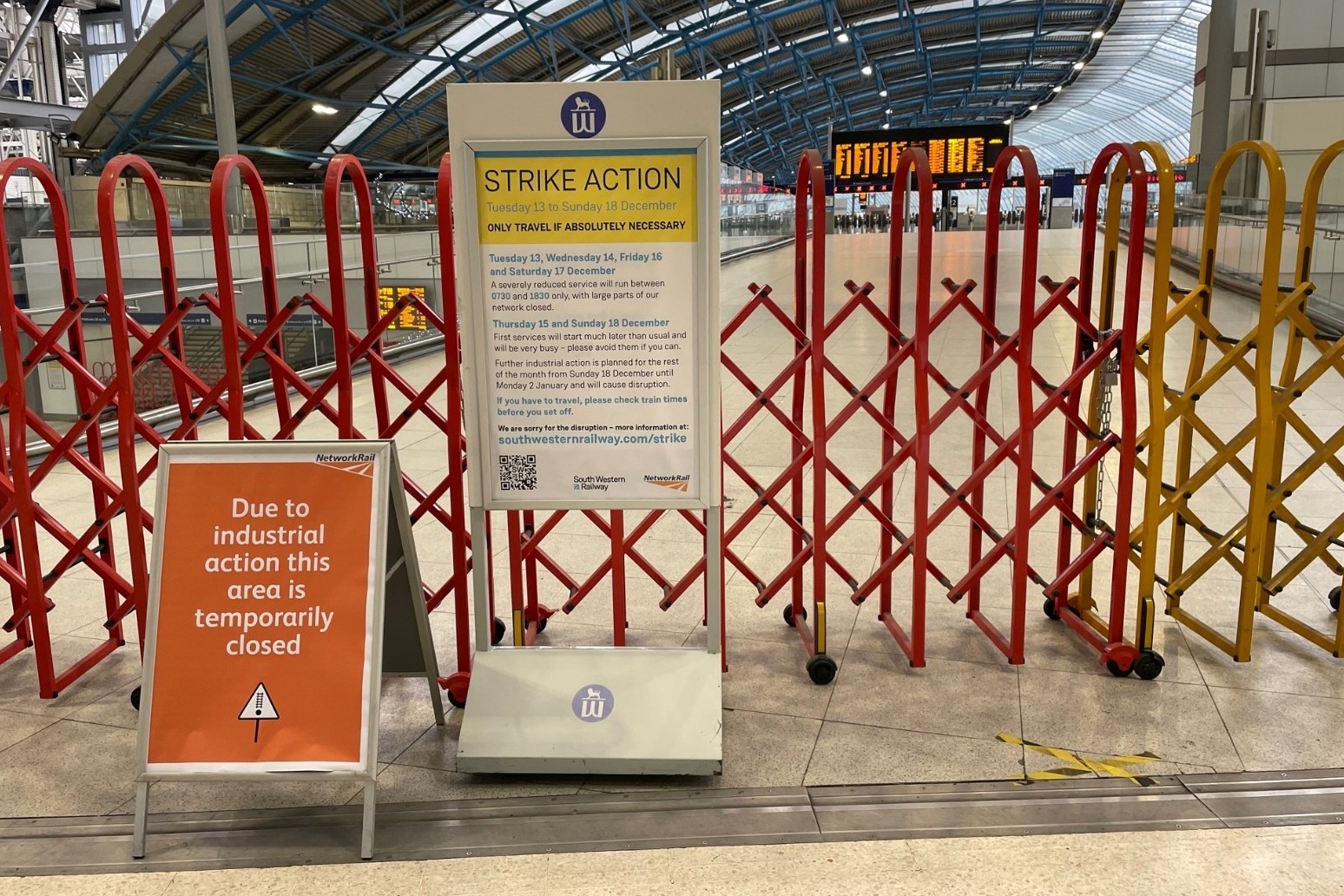
Rail services hit as first wave of strikes begin
Train services have been severely disrupted after rail workers walked out in the first of a wave of 48-hour strikes.
Around half of Britain’s rail lines will be closed all day on Tuesday, with trains in other areas only running between 7.30am and 6.30pm.
Many places have no services, including most of Scotland and Wales.
The same disruption is expected on Wednesday, Friday and Saturday.
Members of the Rail, Maritime and Transport (RMT) union at Network Rail and 14 train companies are striking in a bitter row over jobs, pay and conditions.
Figures from location technology firm TomTom show the level of road congestion in some cities at 8am on Tuesday was higher than the same time last week.
They include London (up from 71% to 86%), Sheffield (up from 65% to 71%) and Glasgow (up from 61% to 78%).
The figures represent the proportion of additional time required for journeys compared with free-flow conditions.
With further walkouts planned, Network Rail has warned there will be significantly reduced services – with trains more crowded and likely to start later and finish earlier – until January 8.
RMT workers at Network Rail will strike from 6pm on Christmas Eve until 6am on December 27, disrupting getaway journeys and maintenance work.
The Transport Salaried Staffs Association announced on Tuesday that its members at operator CrossCountry will strike on Boxing Day and December 27.
The Office for National Statistics said 417,000 working days were lost to labour disputes in October, which is the highest since November 2011.
RMT general secretary Mick Lynch apologised for the impact of rail strikes on passengers.
He told the PA news agency: “We don’t like disrupting the public and we apologise for the disruption that’s being caused.
“I believe we could have worked towards a settlement a couple of weeks ago until that was undermined by the stance that certain people have taken.
“So we do apologise and we hope that people can amend their plans and get to where they need to go during this period, but they can be assured that we’re working to try and get an agreement so that we can end this dispute.
“Many people of course that are travelling are also suffering similar things – health workers, postal workers, people working in all sorts of industries and sectors who are suffering the same issues of low pay, conditions being stripped out, and attacks on their job security.
“So if we can stick together across the working class we can maybe get some settlements that they can support and we can get back to work and run society in a better way.”
Asked if the public can expect more strikes in 2023, he replied: “Well, we hope not. We want to get a deal but at the moment there is no deal in sight.”
This echoed comments made by Network Rail chief executive Andrew Haines, who told BBC Breakfast “the way forward isn’t obvious”.
Rishi Sunak told his Cabinet that the country faced a “challenging period” with a wave of industrial action over coming weeks.
The Prime Minister’s official spokesman said: “The Prime Minister opened Cabinet by saying the country is facing significant industrial action across a range of sectors this winter and that this will be a challenging period to get through.
“He added that the Government had been fair and reasonable in its approach to agreeing the independent pay review bodies’ recommendations for public sector pay rises and in facilitating further discussion with unions and employers.”
Transport Secretary Mark Harper was repeatedly challenged on whether he had insisted on a condition requiring driver-only trains as part of an improved pay deal – something which the RMT is vehemently opposed to.
Mr Harper told Sky News: “Reform of the rail industry has been on the table from the very beginning.”
He added: “The detailed negotiations between the employers and the trade unions are between them. The overall amount of money available is something that I have to set, the detail is up to them.
“Driver-only trains are not a new thing. They have been running since the 1980s.”
Network Rail had offered a 5% pay rise for this year – backdated to January – with another 4% at the start of 2023 and a guarantee of no compulsory job losses until January 2025.
The RMT said 64% of its members who voted rejected the proposal.
Meanwhile, nurses in England, Wales and Northern Ireland are set to walk out in a row over pay on Thursday after talks with the Government broke down on Monday night.
Thousands of appointments are expected to be cancelled in the next few days.
Matthew Taylor, head of the NHS Confederation, said patients can expect a bank holiday-level of service in hospitals during the strike.
Physiotherapists in England and Wales have voted to strike in their first ever ballot on pay.
The Chartered Society of Physiotherapy said 54% of its members voted in the ballot and of these, 84% voted yes to strike action.
Industrial action is expected to take place early in the new year.
Midwives and maternity support workers in Wales who are members of the Royal College of Midwives have also voted to go on strike over pay.
Published: by Radio NewsHub